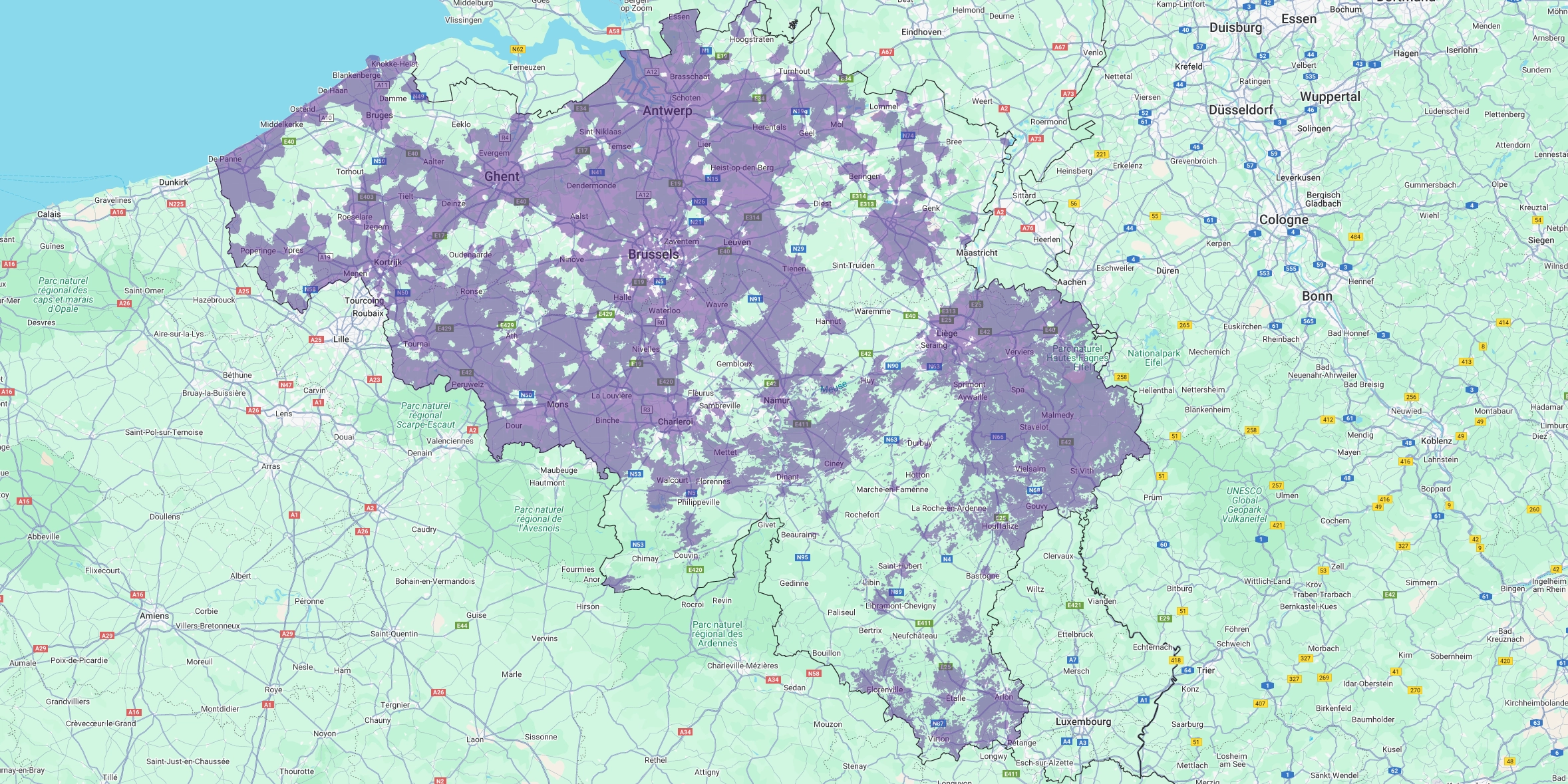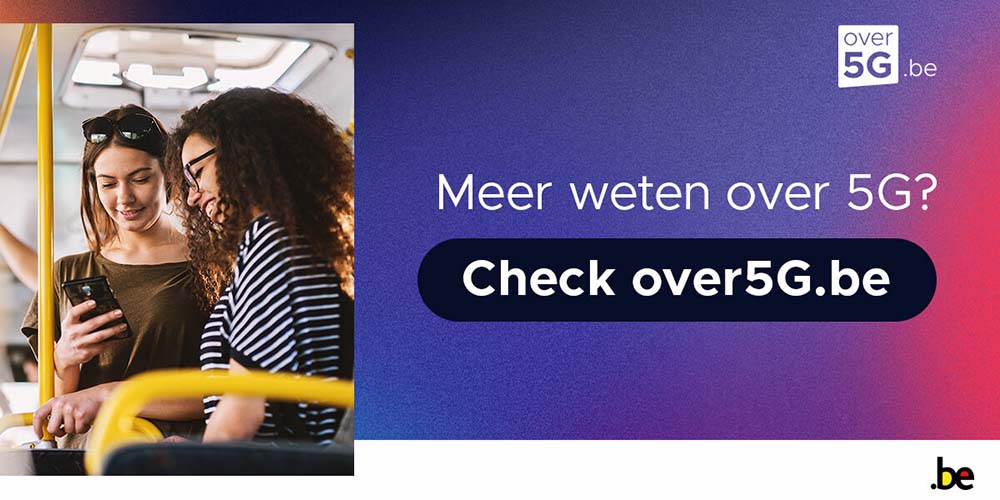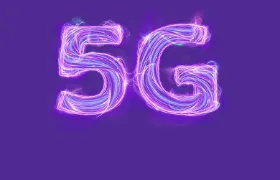What is 5G?
At Proximus, our priority is to offer our customers the experience and the services they expect from us. Therefore, we must anticipate their expectations to stay ahead. In the future, we will all use more and more mobile data, through more intensive use of services such as high definition video streaming, innovative industry solutions and remote working.
We have a strong track record in pioneering mobile communications to deliver the best possible mobile experience to our customers. We aim to build on this by further strengthening our mobile network. This is why 5G is so important: The faster speed – up to ten times faster than 4G – enables new applications and ways of working, such as decentralized clouds and the Internet of Things (IoT). Additionally, its ultra-low latency allows for the hyper-realistic rendering of virtual reality images.
Imagine this … You get ready for work.
You handle your e-mails on your way to the train station.
No need to worry about traffic or red traffic lights!
Your car automatically parks in the nearest free spot at the train station. Very efficient!
During your train ride you get swept away in your Star Wars game with virtual friends.
On your way to the office, you follow an online conference.
And after a long day's work you get a message from your doctor. Time to go to the gym!
Before heading home, you work-out at the gym where you watch the latest James Bond movie in real-time.
Isn't this marvellous?
===
Science fiction? This future is closer than you think. We consume more and more data every day: for video, music, gaming … and so much more. Plus we use more and more devices at the same time: TV, smartphone, laptop. So we need to invest in an infrastructure that can cope with the exponential growth of data consumption AND can support a multitude of devices to operate at the same time. With a high level of quality, of course.
5G is the answer for that hyper-connected future. It stands for a real revolution that will change our lives, our work, our society. Thanks to its ultra-high speed, its potential to simultaneously connect a high variety of devices and its response time without delay, 5G will open up a world of endless possibilities, in the near and further away future.
You will gain time thanks to instant download experience and super-fast surfing. You will enjoy watching ultra-high definition videos or playing real-time games, when you're out and about. And you can even relax in your collision-free self driving car, because data is transmitted without delays.
Are you ready to be part of our 5G revolution? Almost!
Compare it to revolutions like the invention of electricity, cars or computers: it takes time and effort before it is widely spread. First of all, you will need a 5G network. Proximus has always been the frontrunner in offering the best quality mobile networks. That's why, today, we are significantly investing in the deployment of your 5G network of the future. In the coming years, we will gradually improve its coverage in Belgium.
As soon as 5G is up and running in your region, all you need is a 5G enabled device and a specific 5G mobile plan.
The future starts now!

Roll-out progress
In 2022, Proximus has secured the largest spectrum sharein the market for the next 20 years, enabling us to increase our mobile capacity and roll-out 5G in an optimal way. This gives us a head start in terms of network quality and allows us to continue offering the best mobile experience in Belgium.
According to the latest BIPT annual test campaign, Proximus network scores best for both 4G and 5G download speed, and has the lead in mobile coverage. On the international scene, OpenSignal, a leading independent analyst of consumer mobile experience, also recognizes Proximus as the leader in 5G download speeds.

5G spectrum auction
In the context of the spectrum auction, Proximus has secured an attractive spectrum package in the 900 MHz, 1400 Mhz, 1800 MHz and 2100 MHz band, as well as in the newly auctioned 700 MHz and 3600 MHz bands, essential for a large-scale 5G deployment. These spectrum licenses represent a total investment of EUR 491 million for a period of 20 years (18 years for the 3600 MHz band).
The benefits of 5G
Discover all the benefits of 5G! Explore the carousel below to learn how 5G enhances speed, connectivity, and innovation, with reduced reaction time, improved energy efficiency, greater capacity, stability, and network slicing.

Internet surfing speed
5G will progressively offer ever increasing mobile internet speeds: starting from up to 30% faster than 4.5G and going to several gigabits per second in the future.

Reduced reaction time
Today’s latency, or reaction time, is 25 to 35 milliseconds, depending on the location and conditions. 5G allows us to significantly reduce latency – to just a few milliseconds – greatly improving the user experience. Such very low latency will be required to enable new applications, such as industrial processes, or hyper realistic images of virtual reality with an attenuation of dizziness and nausea.

Energy efficiency
5G improves the efficiency of transmitting mobile data: less energy is required for the same amount of data and 5G networks use little power when traffic is low, further reducing the power consumption of the antennas. This is essential to cope with every-increasing mobile usage. Plus, we use green energy to power our network.
5G for your business
English audiodescription on French video
English audiodescription on Dutch video
5G opens a world of new opportunities for businesses. Faster speeds will enable new applications and ways of working, such as decentralised clouds and Internet of Things (IoT). Very low latency will allow hyper-realistic rendering in virtual reality images with an attenuation of dizziness and nausea.
Proximus recently launched a 5G innovation platform that enables businesses to explore the opportunities of 5G for their specific applications. This dedicated co-creation environment can be used to test and validate 5G use cases before they go live.
Three 5G innovation labs have been established in partnership with advanced engineering center A6K, Howest and POM Fabriek Logistiek, to foster co-creation of relevant 5G use cases. Furthermore, the 5G technology allows us to set up a Mobile Private Network (MPN) for enterprises and public institutions. Thanks to this, they can run their private network and provide a service in a more secure and controlled way.
In November 2022, Proximus Group affiliate BICS successfully set up the first-ever intercontinental 5G Standalone (SA) roaming connection between Proximus’ 5G network and a 5G network in the Middle East
Discover 5G for your business5G for your life
With its high speeds and low latency, 5G will improve the user experience from its launch. However, it will also grow into something bigger: connected cars, robots and smart homes that perform household tasks on their own, augmented reality entertainment, universities, and schools connected to each other and to the world, real-time diagnosis and remote medical operations, and so much more.
Discover how 5G will improve your life
Can you benefit from 5G in your area?
The 5G network will also be rolled out gradually. To find out if 5G is available in your area, consult our interactive map.
The facts of 5G

5G & health
Proximus is well aware of the concerns and challenges concerning 5G, radiation, and health. We commit to providing clear and useful information on these issues, as well as taking the necessary precautionary measures.
5G and our health?
5G & privacy
5G does not present any particular risk in terms of data retention and privacy. We have put in place strict measures to ensure full compliance with all relevant privacy and data protection legislation, including the General Data Protection Regulation (GDPR), and we communicate transparently with our customers about the use of their data.

5G FAQ
Want to know more about 5G? We have collected together our answers to the most frequently asked questions.
Your questions answered
5G ready
Faster speeds, lower latency, a better experience. Are your devices ready for 5G?
Discover our 5G devices
Position and info on 5G by the government
over5G.be is an initiative of the Federal Government, the Flemish, Walloon and Brussels governments, the FPS Public Health and the BIPT, with the cooperation of Sciensano



